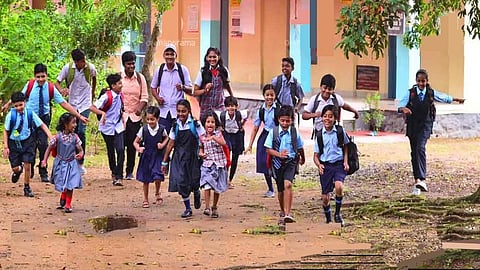Kerala govt mulls review of SC directive to set up new primary schools
Thiruvananthapuram | The Kerala government is considering filing a review petition against a recent Supreme Court directive to immediately establish lower and upper primary schools in areas currently lacking them, state General Education Minister V Sivankutty said on Wednesday.
He said the move is being examined in the context of the Right to Education Act.
"The government is closely examining the apex court verdict," Sivankutty told reporters here.
The Supreme Court on Tuesday directed the Kerala government to take a "holistic decision" to set up government lower and upper primary schools in all areas where none are functioning.
The court was hearing the state government’s appeal against a Kerala HC order on a petition seeking the establishment of a school in Elambra in Manjeri Municipality, where there were no primary educational institutions within a 3-4 km radius.
The High Court had directed the municipality to take urgent steps for the construction of the necessary buildings.
"While respecting the verdict in the case related to sanctioning a school in Elambra, Malappuram, the government is considering filing a review petition after assessing the practical implications of the court’s observations," Sivankutty said.
The minister highlighted that Kerala’s educational landscape differs significantly from many northern states. Citing data from the National Statistical Office and NITI Aayog, he emphasised that Kerala leads in key education indicators, with 100 per cent literacy and a robust network of schools.
He noted that most residential areas in the state have government or aided schools within a 1-2 km radius. Dropout rates are nearly zero, ensuring no child is denied schooling due to the lack of access.
In the Elambra case, the minister said the local body had offered land and a building free of cost, which the government would give special consideration.
Reiterating the state’s commitment to implementing the Right to Education Act, Sivankutty said any steps taken should be scientific and practical.
He said Kerala’s general education sector remains one of the strongest in the country, and a comparison with other states underscores its relative advantage.
"Uttar Pradesh, with over 24 crore people, runs around 2.5 lakh schools but faces heavy pressure due to high student loads per institution. Bihar, with a population of over 13 crore, has only about 93,000 schools, leading to severe classroom congestion," he explained.
"In contrast, Kerala, with a population of just 3.5 crore, has nearly 16,000 schools. More importantly, the state prioritises student-focused facilities and improved teacher–student ratios over merely increasing the number of institutions," Sivankutty said.
He added that this approach has helped Kerala stay ahead of the national average in infrastructure and educational standards. The state continues to rank among the top performers in the Performance Grading Index (PGI), which assesses learning outcomes, infrastructure, equity, and governance.
Kerala also maintains strong results in literacy, teacher training, and physical facilities, on par with states such as Punjab and Chandigarh, he noted.
"So our priority is not simply to increase the number of schools, but to elevate existing institutions to international standards," the minister said, adding that the data underscores Kerala’s status as "a national model in school education."


